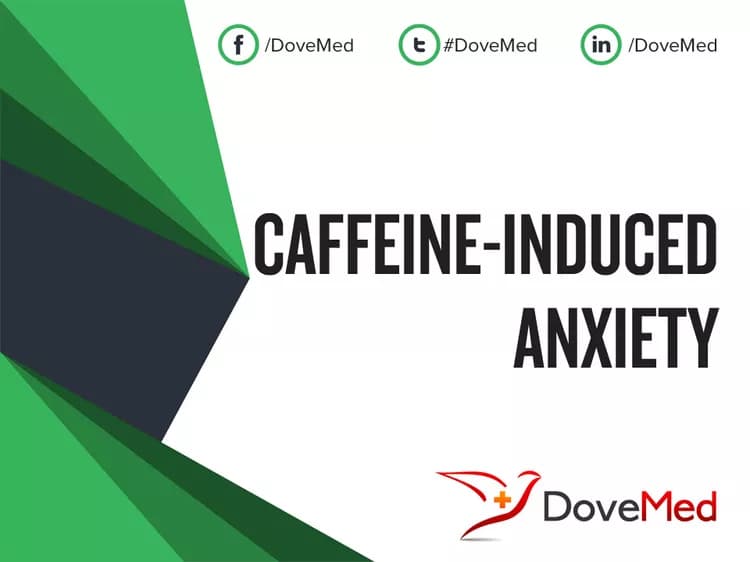What are the other Names for this Condition? (Also known as/Synonyms)
- Caffeine-Induced Anxiety Disorder
What is Caffeine-Induced Anxiety? (Definition/Background Information)
- Caffeine-Induced Anxiety is a condition caused by consumption of excess caffeine resulting in the individual feeling extremely anxious
- Caffeine-Induced Anxiety is caused by the effects of caffeine on brain’s neurotransmitters; neurotransmitters are essential for cell-to-cell communication in the brain
- Globally, caffeine tops the list of stimulants used. Caffeine is legal and is present in many beverages, foods, and chocolates. Since caffeine is a popular beverage among young adults, it is believed that this particular population is more at risk for developing Caffeine-Induced Anxiety
- Additionally, individuals with pre-existing anxiety issues and those who have a history of anxiety following consumption of a caffeinated drink are more prone to developing the condition
- Some common symptoms associated with Caffeine-Induced Anxiety are restlessness, nervousness, confusion, shaking, and insomnia. The symptoms can be brought under control successfully, once the affected individual stops caffeine intake
- The most effective prevention is recognition of the condition and taking steps to avoid excessive amounts of caffeine. The prognosis for Caffeine-Induced Anxiety Disorder is generally excellent with suitable treatment
Who gets Caffeine-Induced Anxiety? (Age and Sex Distribution)
- Prevalence rates of Caffeine-Induced Anxiety are not well known
- Young adults consume more caffeine, and hence, are more prone to developing the condition
- Individuals, who consume energy drinks with high amounts of caffeine, are also affected by Caffeine-Induced Anxiety
What are the Risk Factors for Caffeine-Induced Anxiety? (Predisposing Factors)
Some risk factors for developing Caffeine-Induced Anxiety include:
- Lack of knowledge about the product contents (such as energy drinks): Many energy drinks contain high quantities of caffeine
- Being a naturally anxious person: Having episodes of anxiety or having an anxious personality
- Prior history of feeling anxious when taking caffeine: Different individuals react differently to caffeine; some individuals are biologically more at risk for Caffeine-Induced Anxiety
- Family history of the condition
- Smoking
It is important to note that having a risk factor does not mean that one will get the condition. A risk factor increases ones chances of getting a condition compared to an individual without the risk factors. Some risk factors are more important than others.
Also, not having a risk factor does not mean that an individual will not get the condition. It is always important to discuss the effect of risk factors with your healthcare provider.
What are the Causes of Caffeine-Induced Anxiety? (Etiology)
- Caffeine-Induced Anxiety is caused by the effect of caffeine on the brain’s neurotransmitters. Neurotransmitters are responsible for regulating emotions through cell-to-cell communication in the brain
- Caffeine increases the release of a neurotransmitter called norepinephrine, a chemical that is responsible for response to stressful situations
- The increased release of norepinephrine causes an elevated activity in the brain, and can produce symptoms similar to a panic attack
What are the Signs and Symptoms of Caffeine-Induced Anxiety?
Some common symptoms of Caffeine-Induced Anxiety are seen shortly after caffeine is consumed. It may include:
- Red face
- Restlessness, nervousness, and shaking
- Muscle twitching
- Rambling or confused speech
- Headaches
- Sweaty hands and feet
- Insomnia
- Excessive urination
- Ringing in the ears
- Some individuals may have a feeling of impending doom (negativity)
- Some individuals react inappropriately (overreact), even to mildly stressful situations
How is Caffeine-Induced Anxiety Diagnosed?
For the diagnosis of Caffeine-Induced Anxiety, a healthcare provider might employ one or more of the following methods:
- A physical examination
- Evaluation of medical history of the affected individual
- An assessment of symptoms
- According to the US Diagnostic and Statistical Manual of Mental Disorders IV (DSM IV), the criteria for Caffeine-Induced Anxiety are that the anxiety symptoms must exceed (or be more intense than) the effects of the drug itself
Many clinical conditions may have similar signs and symptoms. Your healthcare provider may perform additional tests to rule out other clinical conditions to arrive at a definitive diagnosis.
What are the possible Complications of Caffeine-Induced Anxiety?
The complications associated with Caffeine-Induced Anxiety are reported to occur more with the ingestion of caffeine alone (such as in pure caffeine pills). Some complications may include:
- Fertility issues
- Bone loss
- Ulcers
- Gastrointestinal symptoms
For individuals at risk, ingesting caffeine can be a problem in a social setting when one does not know that a product contains high amounts of caffeine.
How is Caffeine-Induced Anxiety Treated?
Generally, no treatment may be necessary for Caffeine-Induced Anxiety, since the caffeine effects subside rather quickly, in a majority of individuals.
- In some cases, however, anti-anxiety medication may be given to reduce symptoms of anxiety
- Cessation of caffeine as a method of overcoming symptoms may also be necessary
How can Caffeine-Induced Anxiety be Prevented?
- The best way to prevent Caffeine-Induced Anxiety is being aware of one’s own response to caffeine, since the effects of caffeine on each individual may be different
- Often, substituting de-caffeinated products may also help prevent symptoms of Caffeine-Induced Anxiety from developing
What is the Prognosis of Caffeine-Induced Anxiety? (Outcomes/Resolutions)
- The prognosis of Caffeine-Induced Anxiety is considered excellent
- The condition can readily be alleviated by reduced coffee drinking and avoiding caffeine-containing products
Additional and Relevant Useful Information for Caffeine-Induced Anxiety:
- Oral doses of caffeine greater than 10 grams can be fatal in adults
- More than 97% of caffeine consumed by adults and teenagers comes from beverages
- About 80% of adults in the United States consume caffeine in some form on a daily basis
Related Articles
Test Your Knowledge
Asked by users
Related Centers
Related Specialties
Related Physicians
Related Procedures
Related Resources
Join DoveHubs
and connect with fellow professionals


0 Comments
Please log in to post a comment.